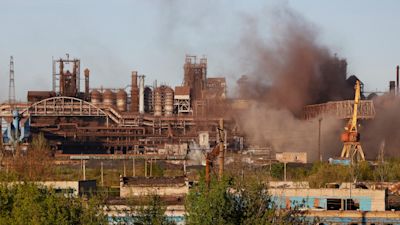At least 100 civilians still trapped at Mariupol steel works amid Russian assaults, officials say

Correspondent Dan Rivers reports from Ukraine, where missiles have hit Odesa and the president warns of foreign food shortages
At least 100 civilians are still trapped in the besieged Mariupol steelworks, a Ukrainian official has said, despite earlier reports suggesting all those stuck in the sprawling plant had been rescued.
In recent days, the United Nations and Red Cross organised a dramatic rescue of what some officials said were the last civilians trapped at the plant in the southern port city.
However, on Tuesday, two officials said about 100 people were believed to still be in the complex’s underground tunnels, which continue to be targeted by Russian assaults, according to Ukrainian accounts.
Along with civilians, an estimated 2,000 Ukrainian fighters, representing the last pocket of organised resistance in the embattled city, remain holed up at the steel works in the strategic port on the Azov Sea.
"In addition to the military, at least 100 civilians remain in the (Azovstal) shelters," Mariupol mayoral aide Petro Andryushchenko said.
"However, this does not reduce the intensity of attacks by the occupiers."
Last week, Ukrainian officials believed around 200 civilians were trapped at the plant, though current estimates are contested.
Donetsk regional governor Pavlo Kyrylenko, said that those left behind are the civilians that “the Russians have not selected”. “How and based on what criteria they take people out (of the plant) is something only the occupiers know,” he added. Both of these claims could not be independently verified.
Ukraine's Azov regiment said Russian forces have targeted the Soviet-era industrial facility 34 times over the past 24 hours, with attempts to storm the plant also continuing.
On Saturday, Ukraine’s Deputy Prime Minister Iryna Vereshchuk said all women, children and elderly people had been evacuated from the plant, but Tuesday's comments raise uncertainty over how many people remain trapped.
Much of Mariupol, which had a pre-war population of around 400,000 people, has been reduced to rubble by constant Russian assaults, which have trapped civilians with little heat, food, water or medicine.The deteriorating security situation in the southern city comes as Russian attacks continue targeting infrastructure in other strategically important areas in Ukraine.
In Odesa, the major Black Sea port, one person was killed and five left injured after seven missiles struck a shopping centre and a depot on Monday, according to Ukrainian armed forces.
This targeting is reportedly part of efforts to disrupt the supply lines and weapons shipments that have been critical to Kyiv’s defence against Russian aggression.
Air raid sirens sounded as the missiles interrupted a meeting between European Council President Charles Michel, and the Ukrainian Prime Minister Denys Shmyhal, forcing them into a bomb shelter on Monday.
Odesa is a major gateway for grain shipments, and Ukrainian President Volodymyr Zelenskyy has warned Russia's blockade of his country's Black Sea ports threatens global food supplies.
Mr Zelenskyy, who said he talked with Mr Michel about how to prevent a global food crisis on Monday, has said Ukraine could lose tens of millions of tonnes of grain due to Russia's blockade of its Black Sea ports.
Ukraine and its allies have been trying to find a way to unblock ports or figure out alternate routes for exporting the vital grain, wheat and corn.
With the war now in its 11th week, officials have warned the number of civilians killed in Ukraine since the start of the invasion in February was significantly higher than the 3,381 corroborated deaths.
“The actual figures are higher and we are working to corroborate every single incident,” Matilda Bogner, the head of the UN's human rights monitoring mission, said.
Also on Tuesday, members of the UN General Assembly voted for the Czech Republic to replace Russia on the world organisation’s leading human rights body following its suspension amid human rights violation allegations.
Elsewhere, a top US intelligence official claims eight to 10 Russian generals have been killed during the war in Ukraine.
And Germany’s foreign minister has reopened her country’s embassy in Kyiv that was closed more than two months ago following the Russian invasion.
It has also been stressed that the country will reduce its dependence on Russian energy supplies “to zero, forever".
The German government has said it will end imports of Russian oil and coal this year and of natural gas from Russia by 2024 at the latest.
For expert analysis, listen to the Ukraine episodes of the What You Need To Know podcast
It came as Ukrainian officials said the bodies of 44 civilians had been found in the rubble of a five-storey building in Izyum that was destroyed by Russian forces two months ago.
Despite ongoing Russian attacks, the UK Ministry of Defence (MoD) said in an intelligence update that Moscow's underestimation of Ukrainian resistance has helped lead to "demonstrable operational failings".
"Russia's invasion plan is highly likely to have been based on the mistaken assumption that it would encounter limited resistance and would be able to encircle and bypass population centres rapidly," the MoD tweeted.
"This assumption led Russian forces to attempt to carry out the opening phase of the operation with a light, precise approach intended to achieve a rapid victory with minimal cost.
"This miscalculation led to unsustainable losses and a subsequent reduction in Russia's operational focus."